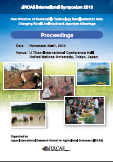Experience and Strategy of International Agricultural Research in the Netherlands

The global demand for food production is expected to double by 2050, especially regarding animal
proteins. Feeding the world within the carrying capacity of planet earth requires smart and highly efficient
agroproduction producing more and better food with less resources (land, water, nutrients, energy,
biocides, antibiotics, etc.) and no draw backs to the environment.
The Netherlands is renowned for its efficient agroproduction, based on tradition, stockmanship,
innovative entrepreneurship and scientific approach. The small (42,000 km2) and densely populated (17
million people) country is the second largest exporter of agricultural products in the world. Top class
farmers and strong multinational agribusiness partners are closely linked to top science, with Wageningen
University rated as the best agrofood faculty of the world by the National Taiwan University Ranking in
2013. The yield per hectare is five times the European average, four agrofood companies are amongst the
world top 40.
It will be explained how the so-called triple helix governance model of interaction between business,
science and government has resulted in the evolution of the agrofood sectors in the Netherlands and what
the forecast of the future development might be.
In the presentation, it will be illustrated how in the Netherlands the scientific support to the agrofood
business is being organized by implementing efficient precision farming practices, including smart
breeding programmes, customized fertilization and nutrition, specific animal care in modern housing,
envirnonmental greenhouse technologies, information and sensor technology, biological control of pests,
eradication and control of disease, and quality control throughout the chain of custody from producers to
consumers, etc.
These principles will be illustrated for sustainable production of animal-source food, based on a concept
named “Livestock Farming with Care.” This concept is founded on care ethics with an integrated approach
following four basic principles: 1) One Health (i.e. healthy and safe for animals and humans); 2) customized
care (i.e. from the individual animal’s perspective and integrity); 3) no nuisance (i.e. from an environmental
and societal perspective); and 4) credible performance (i.e. from an economic and public prospect).
The presentation will be concluded with an overview of global initiatives to come to a sustainable,
responsible and climate smart agriculture on basis of joint research and technology transfer in an
international context.
| 刊行年月日 | |
|---|---|
| 作成者 | Martin C.Th. Scholten |
| 著者キーワード |
Food Security AgroFood Sciences Smart Agriculture the Netherlands |
| 公開者 | Japan International Research Center for Agricultural Sciences |
| オンライン掲載日 | |
| 号 | 2013 |
| 開始ページ | 212 |
| 終了ページ | 223 |
| 権利 | Japan International Research Center for Agricultural Sciences |
| 言語 | eng |
